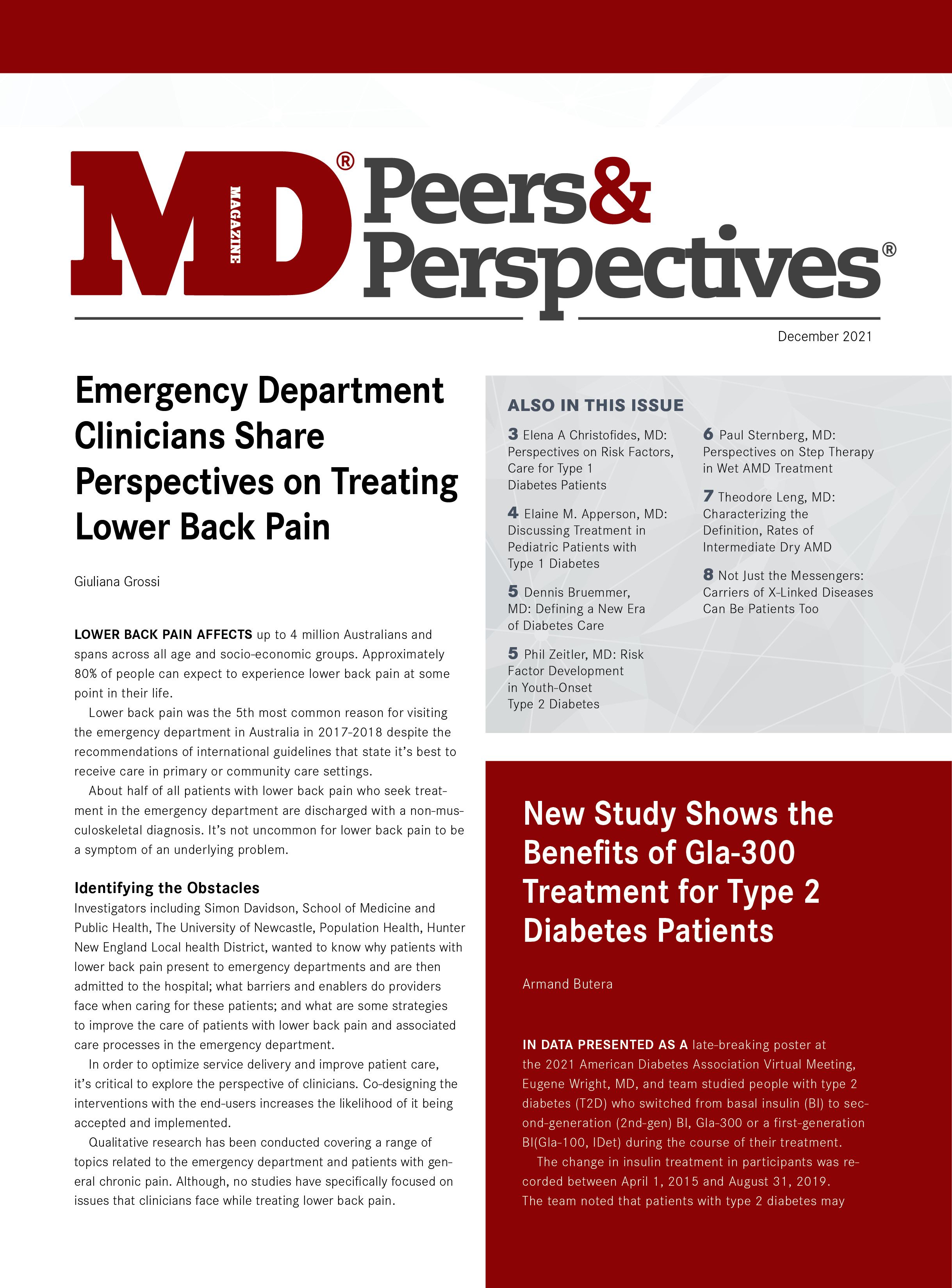Publication
Article
Peers & Perspectives®
Elena A Christofides, MD: Perspectives on Risk Factors, Care for Type 1 Diabetes Patients
Author(s):
In part 1 of a Q&A, Elena Christofides, MD highlights important discussions surrounding ADA 2021, including cardiometabolic medicine and risk factors for T1D.
Elena A Christofides, MD

As the 2021 American Diabetes Association Virtual Meeting concludes, important conversations have taken place surrounding diabetes prevention and treatment, as well as the makeup of at-risk patient populations.
HCPLive recently spoke with Elena A. Christofides, MD, Endocrinology Associates, on her thoughts about cardiometabolic medicine, patients with a predisposition for diabetes, as well as a highlight on the potential efficacy of teplizumab.
Check out part 1 of the interview below:
HCPLive: Just to start, I was just hoping if you could maybe share some of your thoughts surrounding the larger conversation on cardiometabolic medicine, particularly in addressing obesity and diabetes and how important that larger conversation is when it comes to reduction and ultimately prevention of these conditions?
Dr. Christofides: Right. So, I think what is an interesting element of this is I think that the conversation has been really segregated from the two conversations surrounding obesity and cardio-metabolic disease that have really not been talked about together for a long time. There's times when they come together, but I think that they really need to be talked about, the one core component.
You know, we used to talk about it in terms of metabolic syndrome, just metabolism, et cetera. But I think part of the problem is that there are a lot of clinicians, as well as researchers, who are out there talking about diabetes as a distinct and separate disease. And they really don't want to have to think about cardiometabolic disease because not everybody gets cardiometabolic disease who has diabetes. And there are people who have cardiometabolic disease who aren't diabetic, but they, for all intents and purposes look diabetic.
And I think part of the difficulty there is that people want diabetes to only be about the blood sugar problem. And it isn't only about the blood sugar and If you talk about diabetes, people want it to be all about the sugar, but it isn't about the sugar. And then when we talk about cardiometabolic disease, people are like well there’s no diabetes, so it’s not relevant, but in fact it is because they are exhibiting the same defects that we see in diabetics and the same similar outcome. So I guess that's kind of my thoughts on why they should be talked about together, but why people don't.
HCPLive: Absolutely. So, following off of that, how would something like teplizumab, a preventative drug for type one diabetes, affect that sort of care if it were to be approved by the FDA?
Dr. Christofides: Well, so here's the thing. Type 1 Diabetes has nothing to do with anything else in the world and should never be talked about in conjunction with other diabetes. So that's part of the difficulty. Teplizumab is great. I did some clinical trials on type one diabetes prevention drugs a while ago, and they were immune modulators, very similar to teplizumab. That’s really the key feature of type one diabetes is that they're auto immune. They have a completely different problem. It originates differently. They're not one and the same, so it is inherently, ultimately unrelated to any other types of diabetes.
HCPLive: A previous release had mentioned people having higher risk of type 1 diabetes based on nutritional factors, environmental exposures, and things like infections and viruses. Would something like teplizumab have a benefit for patients who are predisposed for T1D?
Dr. Christofides:
Yes. If they are truly predisposed to type 1 diabetes, but the environmental factors that predispose someone to type one are not the same environmental factors that predispose people to Type 2. So it all depends on how you're defining it. So I do think that they defined it well in the study. I do think that the data on the mechanisms of type 1 diabetes at-risk individuals is well-described and well thought out. I just don't think that the world talks about it that way.
HCPLive: Could you follow up on that?
For example, if you eat junk food, you drink soda, you don't exercise, you have obesity, you live in an urban environment where you're maybe micronutrient deficient, you're at risk for type two diabetes then. Because, you're at risk for all the ways that type 2 diabetes is caused and contributed to by lifestyle. None of those things have anything to do with type one, not a single thing. Type 1 is influenced by your genetics in terms of your genetic risk for autoimmune disease influenced by some micronutrient deficiencies, but not the same one that's type 2. To some degree, vitamin D is a commonality, but none of the other ones.
And then, we don't really know what the rest of the environmental factors are. We say that, but it is a lot of hand-waving, it is actually well described. Environmental factors that are well-described are interestingly a seasonality to type one diabetes. You're more likely to get diagnosed with type one diabetes in January through June, as opposed to June through December. And that's where vitamin D comes into play, you are outside more, children are out more, they're playing, they're more likely to be vitamin D sufficient.
But, obesity doesn't have anything to do with type one diabetes. Junk food doesn't have anything to do with type 1 diabetes, unless the person is nutritionally deficient. So that's what I'm getting at is that there are clear genetic risk factors, but those are hard to identify because it requires doing blood work, that requires doing genetic testing and people are universally afraid of genetic testing in the U.S. There's a lot of hand-waving about risk factors, but they're not common to either disease.
Check out part 2 of the interview here.





